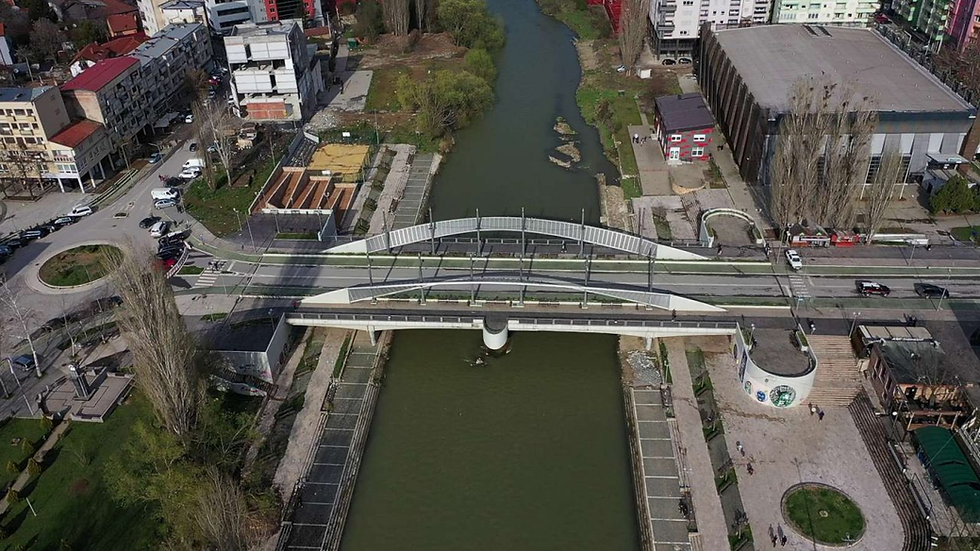Mitrovica bridge will reopen: Kosovo Interior Minister
- Jetta Xhara
- Oct 31, 2024
- 3 min read
Updated: Nov 19, 2024
Kosovo’s interior minister tells BIRN that discussions are continuing about the reopening of the symbolic main bridge in Mitrovica and rejects criticism of unilateral steps towards Serbia and Kosovo's Serb minority.
Jetta Xharra, October 1, 2024
The main bridge in Mitrovica. Photo: BIRN
Kosovo will open the main bridge in the ethnically-divided city of Mitrovica, it is just a question of when, Interior Minister Xhelal Svecla has told BIRN Kosovo’s 'Kallxo Pernime' TV programme.
The planned bridge reopening has developed into another point of dispute between the government of Prime Minister Albin Kurti and Kosovo’s chief Western backers in the United States and European Union.
It has been closed to traffic since the 1998-99 war and the arrival of NATO peacekeepers on the heels of Serbian forces driven out by 11 weeks of air strikes to halt a wave of massacres and ethnic cleansing of Kosovo Albanian civilians.
Serbs on the north side say its reopening will compromise their security; supporters of the government plan point out that another bridge to its east has been open for years. The West wants the issue resolved as part of EU-mediated talks in Brussels.
“Plans for opening the bridge are going on,” Svecla said.
“We are discussing with allies, including [NATO’s peacekeeping force] KFOR. It is not an issue whether the bridge should be open or not. It’s about the moment when the
bridge should be opened and we are discussing [that].”
‘All sides informed about the bridge’
The bridge has become another thorn in the side of Kosovo’s increasingly strained relationship with the Western powers that backed its secession from Serbia in 2008.
The West has repeatedly accused Kurti of taking rash and unilateral steps concerning four Serb-majority municipalities in the north that for years represented Serbia’s last, if unofficial, foothold in its former southern province. The government has tried to stamp out use of Serbian-issued vehicle licence plates and the Serbian dinar currency, to mixed success.
In June last year, the EU imposed punitive measures on Kosovo after authorities tried to install ethnic Albanian mayors in the northern municipalities following an election boycotted by the Serbs living there. The move triggered a violent backlash from Serbs in which dozens of NATO-led peacekeepers were injured.
In August this year, Kosovo police undertook an operation to close down five premises in the Serb-majority north operated by Serbian-backed “parallel institutions”, prompting the US embassy in Pristina to accuse Kurti’s government of “continued instrumentalisation of the Kosovo police to carry out uncoordinated actions”.
The embassy said the government’s actions “will also affect the quality and nature of our cooperation with the Ministry of Internal Affairs and its subordinate elements”.
Svecla said cooperation continued daily.
“With the US embassy, which has reacted that way, we share full confidence,” he said. “We have daily cooperation and continuous discussions.”
“In the vast majority of government actions we have the full consent of all our allies,” he said. “They say themselves that it is indisputable that actions against parallel municipalities, dinars and licence plates are just.”
An agreement had already been reached on the bridge. In 2016, both sides in the EU-mediated dialogue agreed to reopen it on January 20, 2017, but implementation stalled.
Responding to complaints about a lack of coordination, Svecla said: “All sides have been informed about the bridge”.
Copyright BIRN 2007







